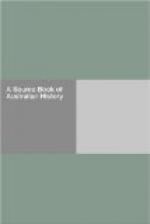We have thought it incumbent upon us to lay before Your Excellency the following circumstances connected with the question of payment of members:—In the session of 1860-1, a separate Bill for payment of members was introduced into the Assembly, but was lost in the Council. In the session 1861, Sir Henry Barkly, who was then Governor, was warned by the Legislative Council of the inevitable consequences of a sum being included in the annual Estimates of Expenditure for the compensation of members of Parliament, and the objectionable item was not included in the Estimates for the year when laid before the Assembly that session.
On five subsequent occasions separate Bills for the same object have been sent up from the Legislative Assembly, three of which were rejected, and the two last were passed by the Legislative Council, but on both these occasions the principal supporters of the Bills distinctly stated that their votes were given on the understanding that the measures were to be tentative only, and limited in their duration.
The question at the present time is in exactly the same position as it was when originated in 1861, and is still in the region of experimental legislation. It is not a mere question of the appropriation of the public revenue, but of public policy upon which an uniform usage has been adopted in the colony, with the concurrence of both Houses, with the marked co-operation of Her Majesty’s Representative in 1861.
The usage, moreover, is in strict conformity with the Royal Instructions which direct that “in the passing of all laws each different matter must be provided for by a different law without intermixing such things as have no proper relation to each other, and that no clause or clauses be inserted in, or annexed to any Act which shall be foreign to what the title of that Act imports.”
We desire to inform Your Excellency that we claim the right to exercise the same free and deliberate vote on any Bill which may be submitted to us for providing compensation to members of Parliament as we have exercised on all previous occasions and we submit that the inclusion of a sum for that purpose in the Annual Appropriation Bill might make such procedure the instrument of enabling one branch of the Legislature to coerce the other.
GOVERNOR SIR G.F. BOWEN, G.C.M.G., TO THE EARL OF CARNARVON, RECEIVED 23RD JAN. 1878. Telegraphic.
23rd Jan. 1878.
In consequence of the rejection of the annual Appropriation Bill by the Legislative Council, ministers have made large temporary reductions in the public expenditure to economise funds for Police Gaols, and protection of life and property to the latest possible moment, and that is about until next May. A number of civil servants and minor officers of the judicial department have necessarily been dispensed with temporarily, but sufficient provision has been made for the administration of Justice and maintenance of law and order. The Government will do nothing contrary to law or Imperial interests.




